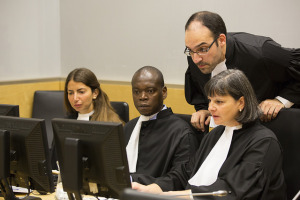By Shawn Macomber • Lawfare Tyranny
Last week we noted International Criminal Court Prosecutor Fatou Bensouda’s much-hailed rejection of a pre-trial chamber’s request that she reconsider her decision not to pursue a case against Israel regarding the Mavi Marmara raid looked more like a behind the scenes power struggle at the Hague than a selfless act of blind justice from a woman incapable of admitting error or submitting herself to the sort of accountability she would like to impose on others.
Likely as not, Bensouda couldn’t stand being publicly second guessed by a gaggle of robes she expects to do her bidding.
At any rate, this morning comes news of more chaos at the Court, as the Appeals Chamber reverses the decision of its Trial Chamber not to refer Kenya to the ICC’s membership over the nation’s failure to heed prosecution requests in its abandoned, “very, very amateur” prosecution of President Uhuru Kenyatta.
From the decision:
The Appeals Chamber finds that the Trial Chamber erred in the exercise of its discretion by conflating the non-compliance proceedings against Kenya with the criminal proceedings against Mr. Kenyatta, by failing to address whether judicial measures had been exhausted, and by assessing the sufficiency of evidence and the conduct of the Prosecutor in an inconsistent manner. The Appeals Chamber finds that these errors materially affected the Trial Chamber’s decision not to refer the matter of Kenya’s non-compliance.In addition, the Appeals Chamber is also of the view that these errors also prevented the Trial Chamber from making a conclusive determination on the existence of a failure to comply with a request to cooperate by the Court contrary to the provisions of the Statute, which prevents the Court from exercising its functions and powers under the Statute, as required by the first clause of Article 87(7) of the statute.
Internecine bickering, it would seem, is what the ICC does best. The aspiring transnational behemoth is certainly better at this than actually deterring atrocities. But is this a billion dollars (and counting) well spent?
As David Davenport memorably put it in Forbes last year:
The obvious question few seem to be asking is whether the I.C.C. is simply too expensive and inefficient to justify. Originally designed to make certain that war crimes, genocide and crimes against humanity were not ignored, the Court is supposed to achieve a sufficiently robust presence that it contributes “to the prevention of such crime.” To that end, it has 34 judges, over 700 staff, and an annual budget of $166 million. They say you can’t put a price on justice but $500 million per warlord conviction seems high by any standard. And what do 34 judges do all day? You don’t have to be a legal expert to figure that the preventive effect of convicting 2 warlords in 12 years doesn’t exactly leave international war criminals shaking in their boots.
But petty spats between bureaucrats regarding intricacies of go-nowhere investigations must terrify them…
